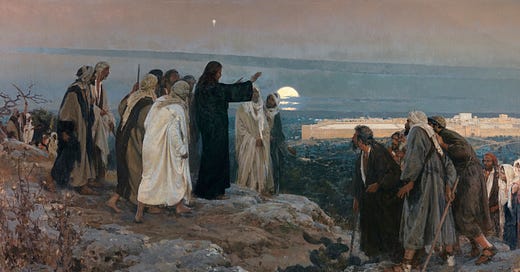Why Christ wept over Jerusalem in Holy Week
It was not too late for them to repent – nor is it too late for us.

It was not too late for them to repent – nor is it too late for us.
Editor’s Notes
On the 9th Sunday after Pentecost, the Roman Liturgy returns to Holy Week – with words from the first Palm Sunday, and then from the following day.
The passage from St Luke’s Gospel read on this Sunday includes the cleansing of the Temple, which Fr Coleridge explains happened on the following day – being associated with Our Lord’s cursing of the Fig Tree.
We previously published part of what is read on the 9th Sunday in Holy Week itself. We provide this below, and in the coming days we will provide Coleridge’s chapter on the most unusual of Our Lord’s miracles separately.
But before all this, we provide below Fr Peter Gallwey SJ’s brief comment on Our Lord’s lament over Jerusalem, taken from The Watches of the Sacred Passion, Vol. I.
“Thy enemies shall compass thee round and beat thee flat to the ground, because thou hast not known the day of thy visitation. All that happened at the taking of Jerusalem, though so appalling, is as nothing to what shall go on in the everlasting prison-house of Hell. The Christian, the child of Heaven, deliberately renounces his birthright and his God, and chooses Satan for his master, and now has what he has chosen. He is in the hands of Lucifer and his fallen angels.
“Thy enemies, lost child of God, shall compass thee round and beat thee flat to the ground, because thou hast not known the day of thy visitation, thy day of privilege, when salvation was easy, when the Mother of God and ten thousand saints and angels were ever ready to pray for thee; when thou couldst have had forgiveness by saying from thy heart the one word, “peccavi”. Alas! alas! The serpent deceived me.”1
Here, then, is the first section:
(Click for the first section)
Follow our projects on Twitter, YouTube and Telegram:
Fr Peter Gallwey SJ, The Watches of the Sacred Passion, Vol. I, pp 159-160.




